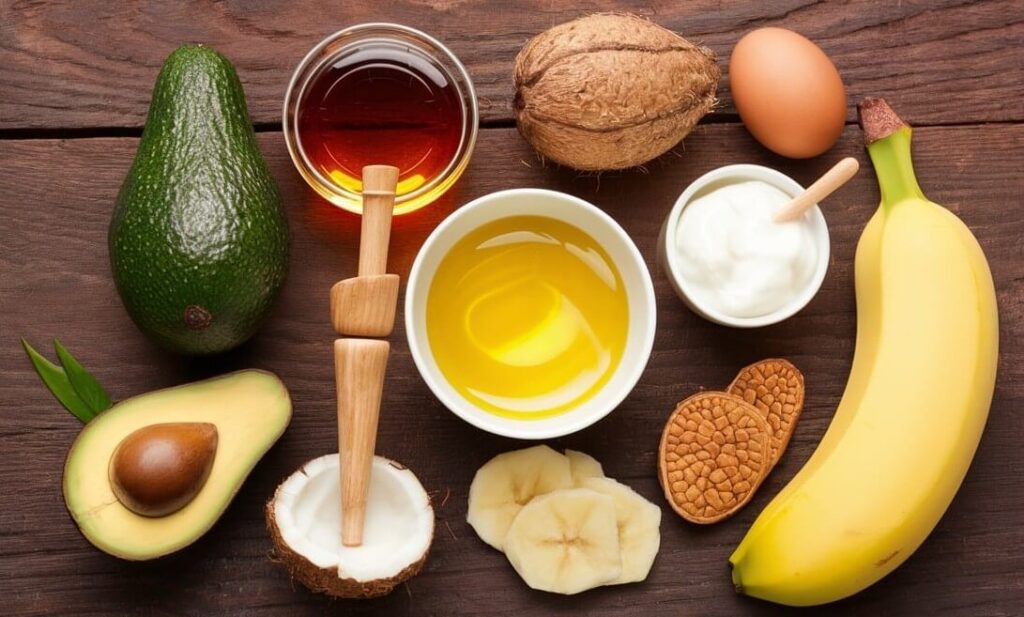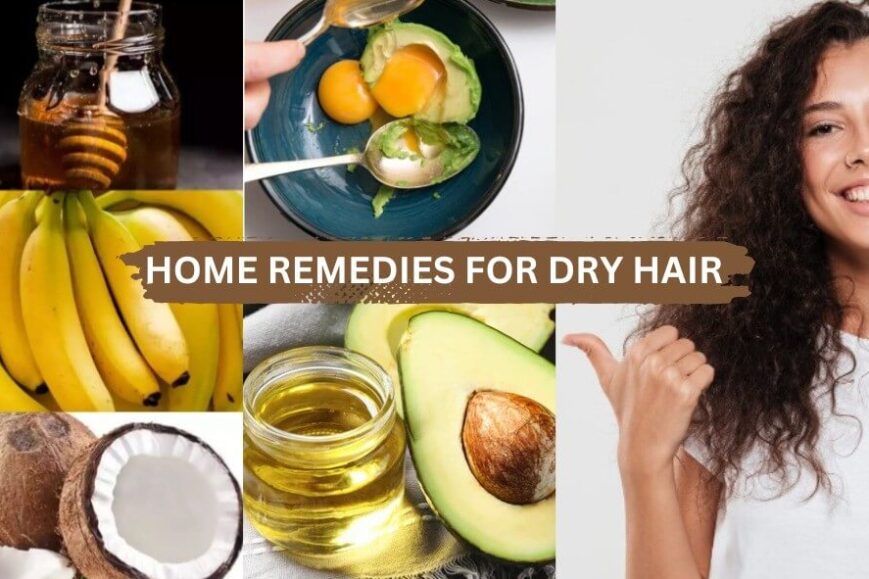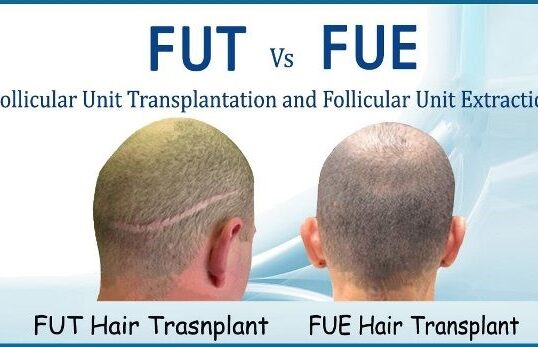Dry hair is a common complaint that most people experience, making their hair look dull and unhealthy. It is essential, and the time comes when the best solution is right at your doorstep.
Home Remedies for Dry Hair are primarily efficient and cause less harm to the hair. This information will assist you in diagnosing and managing dry hair quickly and effectively.
There are home remedies that may surprise you as they are likely to find in your kitchen. If only, one can imagine the glory of getting silky, glossy hair without having to spend a writhing. Alright, let me discuss some of the quick and easy home remedies for dry hair that you can try at home right now.
Say goodbye to dry hair and reclaim your confidence with simple yet effective dry hair solutions you can try at home! With nourishing treatments, restore moisture, shine, and softness to your locks and enjoy healthier, more manageable hair.
Causes of Dry Hair
Some of the highest causes of dry hair include:
- Environmental factors: Influence by weather factors such as wind, sun, and cold weather remove the hair’s natural oils, and Chamomile also dries up hair moisture.
- Heat styling: Daily use of styling tools such as blow-dryers, flat/ curling irons, etc., tends to wear away the outer layer of the hair cuticle, causing dry hair.
- Chemical treatments: Some facilities, such as colouring, bleaching, perming, and relaxing, can upset the hair’s balance, reduce its elasticity, and ultimately deprive it of moisture.
- Frequent washing: Using water frequently on the hair, mainly when using strong shampoos, is likely to remove the natural oils that nourish the hair.
- Age: Aging also affects the skin on the scalp, as it seizes to produce as much sebum, meaning that the hair becomes drier.
- Health conditions: Medical conditions such as thyroid problems and anaemia are other factors that contribute to the growth of dry and brittle hair.
- Diet and lifestyle: Sustenance that is scarce in proteins, vitamins, and other crucial fats hinders hair care and may contribute to dryness.
The Importance of Moisturizing

Daily Hair Care Tips for Dry Hair
Gentle Washing Techniques
- Do not use hot water, as this adversely affects the skin on the head and removes natural hair and scalp oils.
- Rub the Routine Shampoo into the scalp with your fingertips; do not rub it vigorously
- Rinsing off with cool water helps close the cuticle and retain the skin’s moisture.
- Wash your hair with shampoo every 2-3 days or at your discretion based on hair density and daily activities.
Proper Conditioning Methods
- Rinse out the shampoo and then spread the conditioner only on the hair from the middle part down to the tips, not on the root area.
- Let the conditioner stay in the hair for 2-5 minutes before rinsing it.
- Comb through hair with a wide-tooth comb to use the conditioner from the scalp to the tips in order.
- For deep conditioning treatments, it is recommended that hair be covered with a shower cap or warm towel to enhance the penetration of the product.
Avoiding Heat Styling
- Avoid using hot styling equipment like blow dryers, straighteners, and curling irons as much as possible
- To complement the use of hot tools, ensure that you apply heat protectant product on your hair before styling.
- Blow dry hair only when necessary and let it dry naturally.
- Use the lowest heat setting possible, and do not focus the tool on one area for an extended period.
Protective Hairstyles
- Choose a hairstyle that requires minimum manipulation to ensure the most minor tension and damage to hair, such as buns, braids or twists.
- When tying styles, ensure that broader hair ties are used on the softer side of things, such as scrunchies.
- It is also advisable to gently apply pressure on the scalp to increase circulation and healthy hair growth.
Gentle Detangling
- It is also crucial to always uncombed hair when wet with conditioner.
- Brush the hair with a wide-tooth comb or detangling brush from the tips moving toward the roots.
- Handle the hair carefully and avoid excessive force during styling to prevent breakage.
Since every head of hair is different, don’t be scared to experiment with different Home Remedies for Dry Hair to see what combination suits your particular needs and hair type the best.
Home Remedies for Dry Hair& Masks for Dry Hair

Here is a table summarizing the critical homemade hair masks for dry hair & Home Remedies for Dry Hair:
| Mask | Ingredients | Benefits |
|---|---|---|
| Avocado and Olive Oil | – 1 avocado – 2 tbsp olive oil | Nourishes and softens dry hair- Helps repair split ends- Adds shine |
| Honey and Coconut Oil | – 2 tbsp honey – 2 tbsp coconut oil | Deeply moisturizes dry hair- Seals in moisture- Conditions and adds luster |
| Egg and Yogurt | – 2 tbsp yogurt – 1 egg | Strengthens and repairs damaged hair- Cleanses the scalp- Promotes hair growth |
| Banana and Almond Oil | – 1 ripe banana – 2 tbsp almond oil | Hydrates and softens dry, brittle hair- Provides essential fatty acids- Helps reduce frizz |
To use these masks:
1. Mash or blend the ingredients until smooth.
2. Apply the mask from roots to ends, focusing on dry or damaged areas.
3. Cover with a shower cap or towel and sit for 20-30 minutes.
4. Rinse thoroughly with lukewarm water and shampoo as usual.
5. Use these masks 1-2 times weekly for best results.
Follow your Home Remedies for Dry Hair regimen for many weeks to achieve the best benefits because restoring moisture takes time.
DIY Hair Oils for Dry Hair
| Oil | Benefits | Usage |
|---|---|---|
| Coconut Oil | Intensely hydrates and repairs parched, brittle strands Fatty acids penetrate the hair shaft Reduces frizz and enhances shine | 1. Heat a small quantity in the palms. 2. Rub onto scalp and hair from roots to tips. 3. Leave for 30 mins to overnight. 4. Wash with shampoo and conditioner. |
| Argan Oil | Includes vitamin E and fatty acids to moisturize hair Glides along the cuticle, controls flyaways Easily absorbs without forming a greasy layer | 1. Heat a small quantity in the palms. 2. Rub onto scalp and hair from roots to tips. 3. Leave for 30 mins to overnight. 4. Wash with shampoo and conditioner. |
| Castor Oil | Promotes hair growth and thickness Enhances blood flow to the scalp Heals dryness and irritation with antimicrobial properties | 1. Heat a small quantity in the palms. 2. Rub onto scalp and hair from roots to tips. 3. Leave for 30 mins to overnight. 4. Wash with shampoo and conditioner. |
| Jojoba Oil | Mimics natural sebum for thorough hydration Maintains moisture and prevents water evaporation Water-soluble, non-greasy, and rapidly absorbed | 1. Heat a small quantity in the palms. 2. Rub onto scalp and hair from roots to tips. 3. Leave for 30 mins to overnight. 4. Wash with shampoo and conditioner. |
Food for Healthy Hair to include in your diet

A fact that has been ignored by most is that hair health depends on your diet.
Staying Hydrated
It may come as a surprise, but hair also requires hydration as much as the body does, and the same goes for nutrition.
- Continue maintaining the oil levels on the scalp to a healthy optimum level.
- Supplies the necessary nutrients to hair follicles
- Protection from dryness, brittleness and split ends
If you live in a hot and dry climate, are physically active, or follow a high-protein diet, consume at least eight glasses of water daily or more.
Use lukewarm water to rinse out Home Remedies for Dry Hair so as not to remove natural oils. Hair might get even more dry in hot water.
Ingredients to Avoid for Dry Hair
When moisturizing dry, damaged hair, one should avoid ingredients known to worsen the condition of the hair further.
Harsh Chemicals
Chemicals such as formaldehyde, ammonia, and sodium hydroxide used in straightening treatments and relaxers can lead to hair damage by removing its natural oils and moisture. It gradually results in hair dryness, breakage, and unhealthy hair texture in the long run.
Sulfates
Sulfates are strong chemicals used as surfactants in shampoos and soaps. They produce lots of foam but also remove sebum from the hair and scalp. This can lead to dryness, itchiness, and deterioration of the colour of chemically treated hair.
Parabens
Parabens are antimicrobial agents widely employed in hair care products to inhibit microbial growth. However, they have been associated with hormonal imbalances and may lead to skin inflammation on the head of some users.
Alcohol
Products like hairsprays and gels that contain alcohol are unsuitable for hair as they can dry hair. They disappear fast, and as they do so, they pull moisture with them. Choose water-based or alcohol-free products where it is possible to do so.
Silicones
Conversely, silicones give the hair a silky, shiny look. On the negative side, they accumulate on the hair, blocking its ability to absorb moisture. This may result in dryness and weighed-down skin. Seek out products labelled “cone-free” or use a clarifying shampoo occasionally to help wash out any buildup.
Hydration Tips
Drink Plenty of Water
Consuming enough water is crucial for overall hair health. Dehydration can lead to dry, flaky hair and a dry, itchy scalp. Aim for at least eight glasses of water daily, and more if you live in a hot or dry climate, exercise frequently, or have a high-protein diet.
Eat Hydrating Foods
In addition to drinking water, including hydrating nutrition in your diet can help sustain your hair from the inside out. Some great options include:
- Fruits and vegetables with high water range, like watermelon, cucumbers, and tomatoes
- Healthy fats like avocados, nuts, and seeds
- Lean proteins like chicken, fish, and eggs
- Whole grains like quinoa and brown rice
Use a Humidifier
Dry indoor air can strip moistness from your hair. Conducting a humidifier, especially in the winter when heating systems dry the air, can help replenish lost moisture.
Limit Heat Styling
The heat from blow dryers, curling irons, and straighteners can cause hair to lose moisture and become dry and brittle over time. Let your hair air dry whenever possible, and use heat styling tools on the lower setting.
Apply Hair Oils and Serums
Applying nourishing oils and serums to damp hair can assist in sealing in moisture and protect against dryness. Some great options include:
- Coconut oil
- Argan oil
- Jojoba oil
- Moroccan oil
- Silicone-based hair serums
Use a Moisturizing Shampoo and Conditioner
Look for sulfate-free shampoos and conditioners that include moisturizing ingredients like glycerin, panthenol, and fatty alcohol. Avoid over-shampooing, which can strip natural oils from the hair and scalp.
Deep Condition Regularly
A deep conditioning therapy once or twice a week can help replenish moisture and strengthen dry, damaged hair. Apply the treatment from mid-length to ends, cover it with a shower cap, and let it sit for 5-30 minutes before rinsing.
Excessive use of hot tools can further dry out hair. Allow hair to air-dry whenever possible and use the lowest heat setting.
Conclusion
Reviving dry, damaged hair is possible with the right combination of home remedies for dry hair and lifestyle adjustments. Nourishing hair masks with ingredients like avocado, honey, eggs, and bananas can deeply hydrate and repair strands.
DIY hair oils infused with coconut, argan, castor, and jojoba provide intense moisture and shine. Proper shampooing and conditioning techniques, such as using gentle, sulfate-free products and leaving conditioner on for a few minutes, help seal in hydration. Keeping a balanced diet rich in hair-healthy nutrients like protein, iron, and omega-3s while staying well-hydrated nourishes hair from the inside out.
By avoiding harsh chemicals, limiting heat styling, and protecting hair from environmental stressors, you can keep your locks looking and feeling soft, smooth, and healthy. With time and experimentation, these home remedies for dry hair can help revive even the driest, most damaged hair.
FAQs home remedies for dry hair
What are the leading causes of dry hair?
The leading causes of dry hair include:
Environmental factors like sun direction, wind, and low humidity
Routine use of hot styling tools like blow dryers, straighteners, and curling irons
Chemical treatments like colouring, bleaching, and perming
Overwashing the hair with harsh shampoos
Underlying health conditions like thyroid disorders or nutritional deficienciesWhat are some effective home remedies for dry hair?
Some of the most effective home remedies for dry hair include:
Coconut oil, olive oil, or argan oil hair masks
Avocado and banana hair packs
Egg yolk and honey treatments
Yogurt and honey masks
Rice milk and honey hair washes
Aloe vera hair masksHow often should I use home remedies for dry hair?
The frequency of using home remedies for dry hair can vary depending on the harshness of your dry hair:
For mild dryness, use treatments 1-2 times per week
For moderate dryness, use treatments 2-3 times per week
For severe dryness, use treatments 3-4 times per weekCan home remedies completely fix dry, damaged hair?
Home remedies can seriously improve the condition of dry, damaged hair, but they may not wholly fix severe, long-term damage. For best results, combine home remedies for dry hair with other strategies like:
Limiting heat styling
Using gentle, moisturizing shampoos and conditioners
Getting regular trims to prevent split ends
Improving your diet and hydrationAre there any precautions to take when using home remedies for dry hair?
When using home remedies for dry hair, be mindful of the following:
Do a patch test first to check for any allergic reactions
Avoid getting oils or masks in your eyes
Rinse thoroughly after treatments to prevent product buildup
Discontinue use if you experience any irritation or worsening of symptoms

